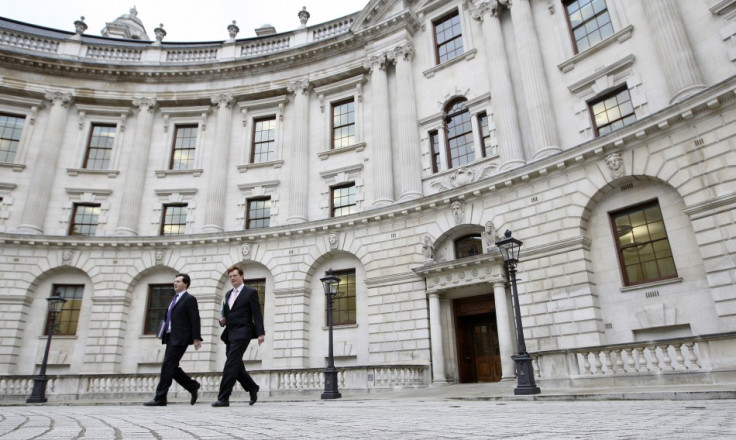EXCLUSIVE: SME Consortium Meets UK Treasury on Banks' Mis-Selling Derivatives

Bully Banks, an independent campaign group for businesses that claim that they have been mis-sold complex derivatives, has met with the UK Treasury to discuss its concerns over the Financial Services Authority's (FSA's) review of UK banks' complex derivative sales activities and how in turn the government can aid them.
Speaking exclusively to the IBTimes UK, Paul Adcock, one of the key members of the group present at the meeting, said that "progress has been made", after Treasury officials sought Bully Banks' views on the recent FSA Review.
"Today's meeting has meant that we have made great progress in terms of getting our voices heard and in opening up better dialogue and communication between small businesses. We are putting a human face onto the fallout out of the banks' actions," says Adcock.
"Four of us at Bully Banks, including myself, Jeremy Roe, Bill Haslam and Ian Parker were able to tell the UK Treasury what our views and concerns are over the FSA's review, and we discussed how the definition of mis-selling products should be better defined.
"Despite the FSA paper at the end of June this year detailing some form of compensation, we told the UK Treasury that there were a lot of issues we are concerned about and need to be improved on as the current recommendations don't quite cover it."
During the meeting, Adcock says that the group outlined clear examples of mis-selling, such as cases of swap terms being longer than the actual term of the loan, and instances in which the product had not, at any point, been fully and clearly defined to the buyer.
Bully Banks was founded by Roe, who runs a chain of holiday cottages, after he said he fell victim to mis-selling. The group is independent and is aimed at publicising what has happened so that those small-to-medium enterprises (SMEs) who have been mis-sold interest rate swap agreements (IRSA) know that there are many others in the same situation, help prompt the exchange of information, coordinate a campaign to involve parliament, the FSA and the media and assist in the coordination of legal action.
Since then, Bully Banks has had hundreds of businesses join the campaign.
Adcock's business Adcock & Sons, a small privately owned electrical retailer in Norfolk, has been a benchmark case study in the unfurling scandal of banks mis-selling derivatives.
Despite UK interest rates sitting at a 300-year low of 0.5 percent, Adcock & Sons is paying an interest rate of 9 percent on a commercial mortgage, which is generating a bill of just under £80,000 a year. As a joint owner of the business, Adcock said that he did not know that the interest rate swap that came with the extra features would have triggered the deal swinging against him.
He was sold, he says, a bet on the Bank of England's key lending rate not falling below 4.7 percent.
Since rates have stood at 0.5 percent since May 2009, he, like many others, has been paying unsustainable amounts on a product that bears little resemblance to the loan he thought he had taken out in the first place. He has had to lay off staff and now says it is unlikely that the business will survive much longer.
Adcock says that the Barclays Capital salesman who sold him the contracts had said that the protection would be "free".
When this case was first publicised, Barclay's said in a media statement that "interest-rate risk management products were sold by Barclays to customers in accordance with the regulatory framework. Barclays is satisfied it provided sufficient information to enable clients to make an informed, commercial decision about the products it offers. Barclays has an ongoing dialogue with Mr Adcock. We continue to work with the company, utilising the expertise of our Business Support team to respond to the challenging market conditions faced by the retailing sector."
Barclays was contacted today by IBTimes UK for an updated statement on Adcock's case but Barclays has yet to respond with a statement.
IBTimes UK has since spoken to a number of other businesses that are accusing various banks of similar selling activities and lawyers representing a number of clients have remarked that their claimant numbers are growing.
The FSA told the IBTimes UK today that it is "wholly focused on getting the right outcome for those people who bought these products and insuring that there is a thorough review of their sales."
Earlier this year, UK lenders Barclays, RBS, HSBC and Lloyds Banking Group agreed to stop selling interest rate hedging products to SMEs after the FSA found them guilty of mis-selling derivatives products.
© Copyright IBTimes 2025. All rights reserved.






















